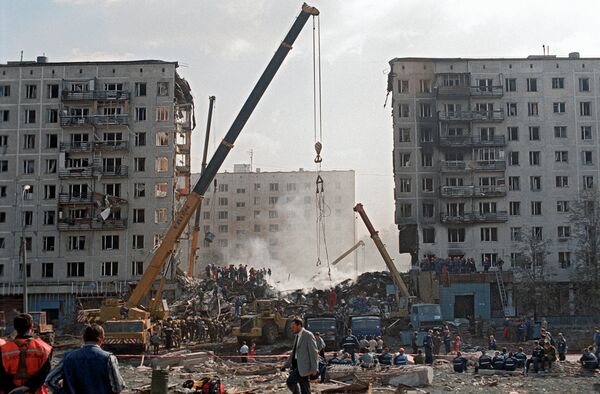MOSCOW, September 8 (RIA Novosti), Ekaterina Blinova - On September 9th, Russians are commemorating the victims of a terrorist attack on Guryanova Street in Moscow, which was carried out by radical Islamists in 1999.
"The criminals have thrown down a sinister challenge. They are trying to scare the Russian people and intimidate the state. We already know who is behind the blasts: The name of the criminal is terrorism," then-President of Russia Boris Yeltsin proclaimed in September, 1999.
During the night of September 9, a sudden, powerful explosion destroyed more than a hundred apartments in a nine-storey housing block on Guryanova Street. The tragedy was later dubbed "Russia's 9/11" by the Western media; 106 died and 264 were injured (among them 86 children). Up to fifteen additional buildings were damaged by the blast.
The Guryanova Street explosion was followed by another act of terrorism in Moscow: an eight-storey building was blown up on September 13 on Kashirskoye Shosse. Just a few days after the second blast in Moscow, terrorists attacked residential buildings in the Russian city of Volgodonsk.
The string of attacks resulted in the deaths of hundreds of innocent Russian civilians and sparked a national debate regarding the need to enhance state security.
An official investigation revealed that the acts of terrorism had been conducted by members of Chechen cells led by radical Islamists Shamil Basayev and Commander Ibn al-Khattab. These terror acts coincided with the Chechen invasion of Dagestan, which Basayev and al-Khattab launched in order to establish an Islamic Republic there.
It's worth mentioning that several days before the tragic events in Moscow, Commander al-Khattab, who reportedly had links to al-Qaeda and its notorious leader Osama bin Laden, claimed that he was going to attack Russia's heartland. "The mujahideen of Dagestan are going to carry out reprisals in various places across Russia," he said, as cited by Agence France Press in an article, "Chechen Guerrilla Khattab, Veteran of Anti-Struggle," published on September 14, 1999. According to the Russian authorities, almost all Islamist insurgents responsible for the explosions in Moscow and Volgodonsk in 1999 were subsequently imprisoned or killed during the antiterrorist operations.
According to pollsters, Russians feel far more secure now than they did in the beginning of the 2000s. The Levada Center's latest survey has indicated that more than half of all respondents believe that the domestic terrorist threat has diminished significantly in Russia in the last decade. At the same time, 55 percent of Russian civilians approve of the Kremlin's policy towards the North Caucasus.
Russians still remember the tragic events of September 1999 and mourn those who were killed in the explosions. In 2000, a bronze monument was erected on the site of the destroyed housing block on Guryanova Street to commemorate the innocent victims of Islamist brutality. Three years later, in 2003, the Moscow authorities ordered that a chapel be built on the site, which would be dedicated to the Icon of the Mother of God, "Joy of All Who Sorrow." The chapel has become a sacred place where people can pray for all of the victims of terrorism.

